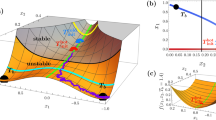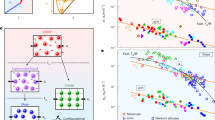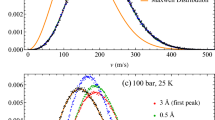Abstract
THE only phase transitions which up to the present time have been thoroughly investigated are transitions between the liquid and gaseous states. As regards transitions between liquids and crystals or between different crystalline modifications, their treatment has not always been quite satisfactory. For example, one sometimes hears not only of transition points (with jumps of energy) and Curie points (with jumps of specific heat), but also of transition points of the nth order, as if there were reason to assume that such generalized transitions can really exist. Some transitions have been attributed to the rotation of molecules, although I cannot see how rotation by itself can lead to discrete transitions. The idea seems to exist that there can be an absolutely continuous transition between the liquid and crystalline state (analogous to the transition liquid-gas), which would require the existence of a miraculous state which is neither isotropic nor anisotropic.
This is a preview of subscription content, access via your institution
Access options
Subscribe to this journal
Receive 51 print issues and online access
$199.00 per year
only $3.90 per issue
Buy this article
- Purchase on Springer Link
- Instant access to full article PDF
Prices may be subject to local taxes which are calculated during checkout
Similar content being viewed by others
Author information
Authors and Affiliations
Rights and permissions
About this article
Cite this article
LANDAU, L. The Theory of Phase Transitions. Nature 138, 840–841 (1936). https://doi.org/10.1038/138840a0
Issue Date:
DOI: https://doi.org/10.1038/138840a0
This article is cited by
-
Condensates formed by prion-like low-complexity domains have small-world network structures and interfaces defined by expanded conformations
Nature Communications (2022)
-
Giant pyroelectricity in nanomembranes
Nature (2022)
-
The Symmetries of Octupolar Tensors
Journal of Elasticity (2019)
-
A theoretical model of phase transitions in human hand movements
Biological Cybernetics (1985)
Comments
By submitting a comment you agree to abide by our Terms and Community Guidelines. If you find something abusive or that does not comply with our terms or guidelines please flag it as inappropriate.



